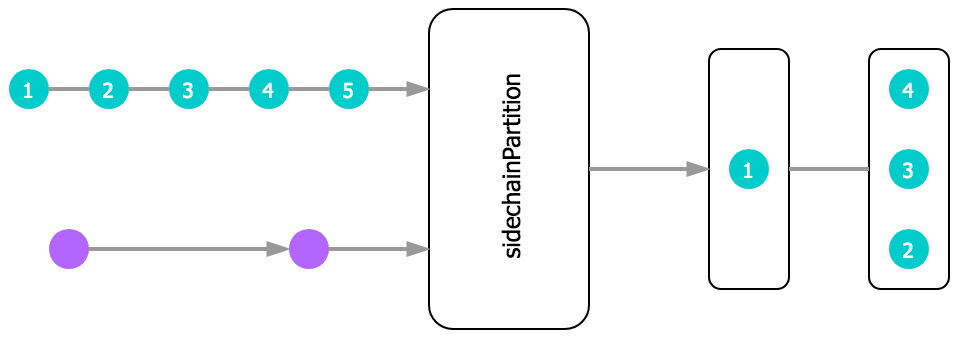This project is part of the @thi.ng/umbrella monorepo.
- About
- Conceptual differences to RxJS
- Installation
- Dependencies
- Usage examples
- API
- Authors
- License
Reactive streams & subscription primitives for constructing dataflow graphs / pipelines.
This library provides & uses three key building blocks for reactive programming:
- Stream sources: event targets, iterables, timers, promises,watches, workers, manual-push...
- Subscriptions: chained stream processors, each subscribable (one-tmany) itself
- Transducers: stream transformers, either as individual subscription or to transform incoming values for a single subscription. See packages/transducers) for 100+ composable operators.
- Recursive teardown: Whenever possible, and depending on configuration, unsubscriptions initiate cleanup and propagate to parent(s).
- Workers: highly configurable, web worker integration for concurrent / parallel stream processing (fork-join, tunneled stream processing, etc.)
(No value judgments implied - there's room for both approaches!)
- Streams are not the same as Observables: I.e. stream sources are NOT (often just cannot) re-run for each new sub added. Only the first sub is guaranteed to receive all values. Subs added at a later time MIGHT not receive earlier emitted values, but only the most recent emitted and any future values
- Every subscription supports any number of subscribers, which can be added/removed at any time
- Depending on configuration options, every unsubscription recursively triggers upstream unsubscriptions (provided a parent has no other active child subscriptions)
- Every subscription can have its own transducer transforming incoming values (possibly into multiple new ones)
- Transducers can create streams themselves (only for
merge()/sync()) - Transducers can cause early stream termination and subsequent unwinding for its parent and downstream subscriptions.
- Values can be manually injected into the stream pipeline / graph at any point
- Unhandled errors in a subscription will move the subscription into an error state and cause unsubscription from parent (if any). Unhandled errors in stream sources will cancel the stream.
- Much smaller API surface, since most common & custom operations can be solved via available transducers. Therefore there's less of a need to provide specialized functions (map / filter etc.) and gain more flexibility in terms of composing new operations.
- IMHO less confusing naming / terminology (only streams (producers) & subscriptions (consumers))
STABLE - used in production
The vast majority of stream & subscription constructors and their syntax-sugar factory functions have been updated to take their various options from a config object arg. Please see Common configuration options for further details.
- @thi.ng/rstream-csp - @thi.ng/csp bridge module for @thi.ng/rstream
- @thi.ng/rstream-dot - Graphviz DOT conversion of @thi.ng/rstream dataflow graph topologies
- @thi.ng/rstream-gestures - Unified mouse, mouse wheel & multi-touch event stream abstraction
- @thi.ng/rstream-graph - Declarative dataflow graph construction for @thi.ng/rstream
- @thi.ng/rstream-log - Structured, multilevel & hierarchical loggers based on @thi.ng/rstream
- @thi.ng/rstream-log-file - File output handler for structured, multilevel & hierarchical loggers based on @thi.ng/rstream
- @thi.ng/rstream-query - @thi.ng/rstream based triple store & reactive query engine
- @thi.ng/transducers - Lightweight transducer implementations for ES6 / TypeScript
yarn add @thi.ng/rstream// ES module
<script type="module" src="https://unpkg.com/@thi.ng/rstream?module" crossorigin></script>
// UMD
<script src="https://unpkg.com/@thi.ng/rstream/lib/index.umd.js" crossorigin></script>Package sizes (gzipped, pre-treeshake): ESM: 5.10 KB / CJS: 5.27 KB / UMD: 5.21 KB
- @thi.ng/api
- @thi.ng/associative
- @thi.ng/atom
- @thi.ng/checks
- @thi.ng/errors
- @thi.ng/paths
- @thi.ng/transducers
- tslib
Several demos in this repo's /examples directory are using this package.
A selection:
| Screenshot | Description | Live demo | Source |
|---|---|---|---|
 |
Interactive image processing (adaptive threshold) | Demo | Source |
 |
Figlet-style bitmap font creation with transducers | Demo | Source |
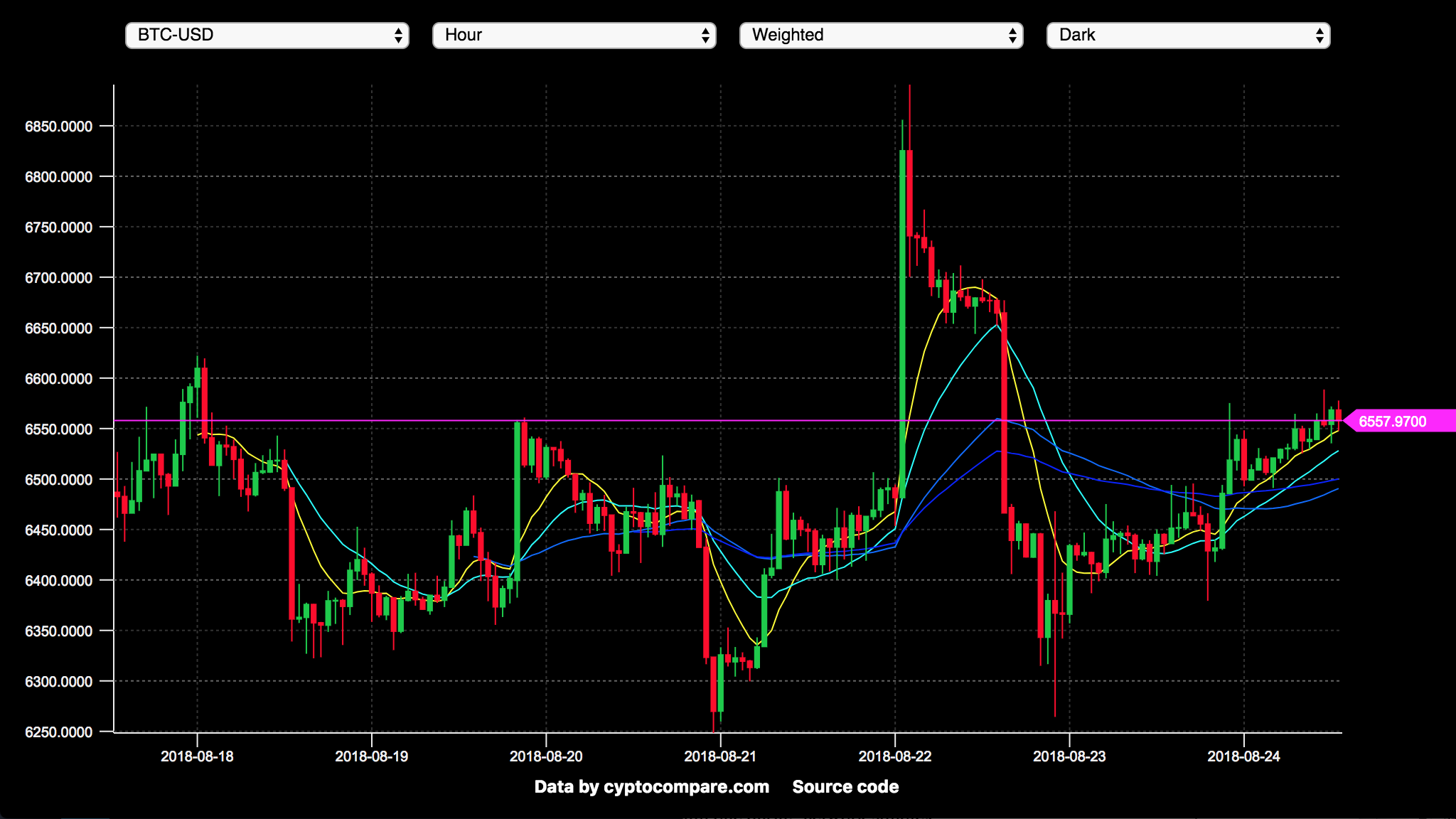 |
Basic crypto-currency candle chart with multiple moving averages plots | Demo | Source |
 |
Interactive pattern drawing demo using transducers | Demo | Source |
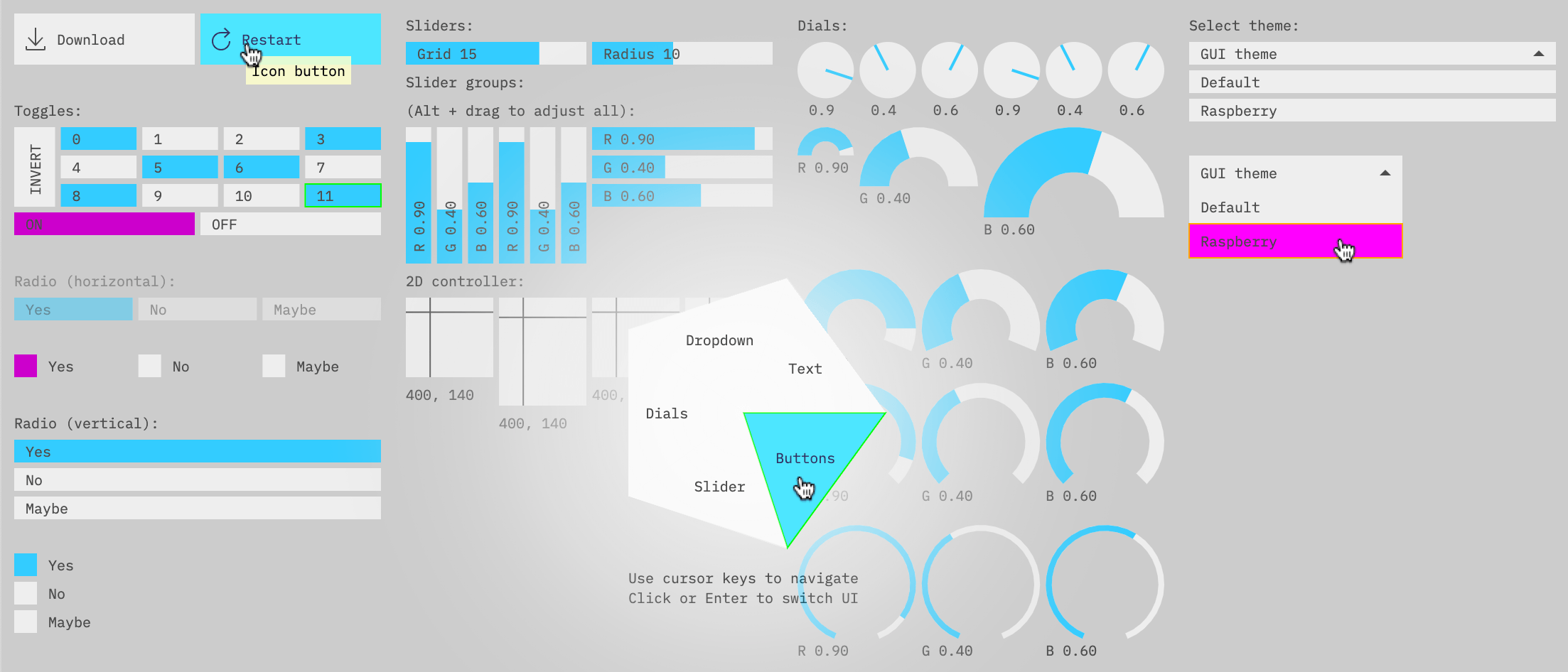 |
Canvas based Immediate Mode GUI components | Demo | Source |
 |
Worker based, interactive Mandelbrot visualization | Demo | Source |
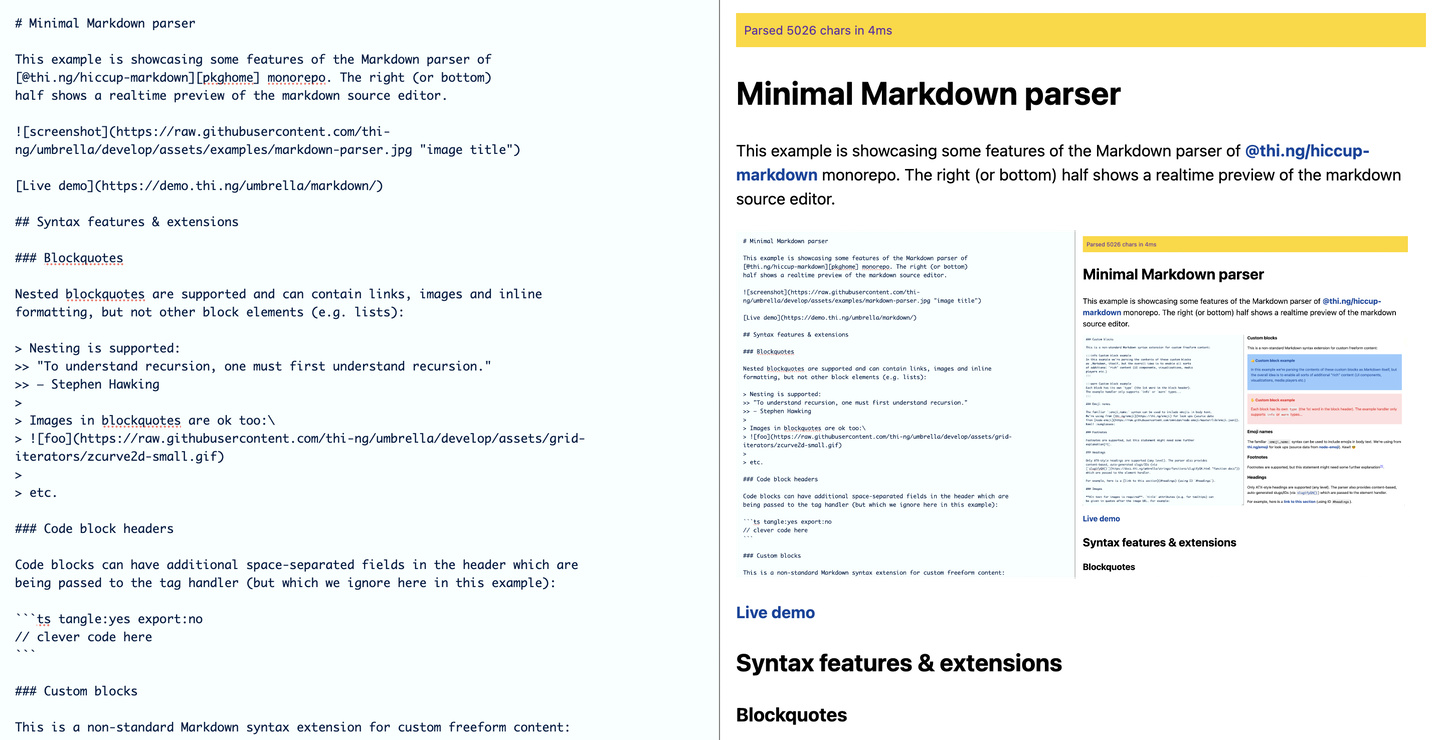 |
Minimal Markdown to Hiccup to HTML parser / transformer | Demo | Source |
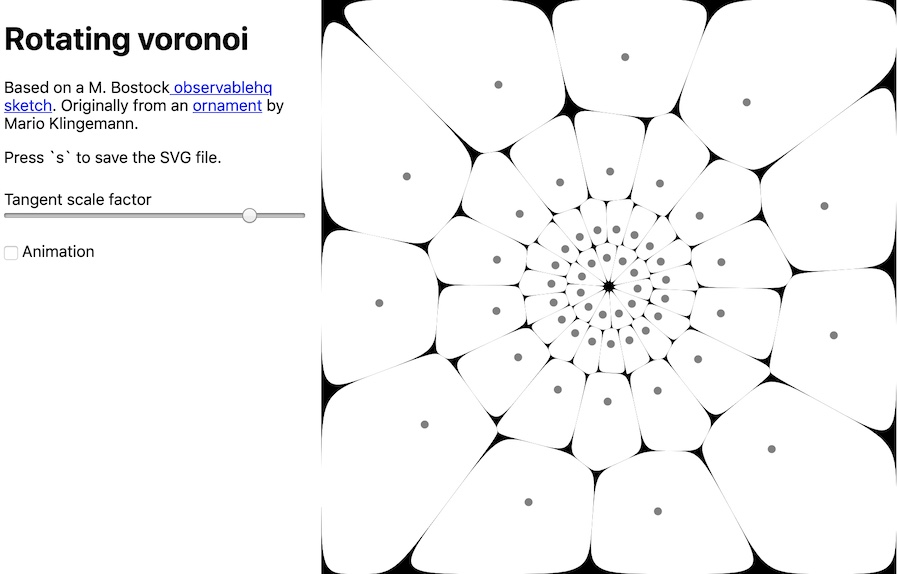 |
Animated Voronoi diagram, cubic splines & SVG download | Demo | Source |
 |
Minimal demo of using rstream constructs to form an interceptor-style event loop | Demo | Source |
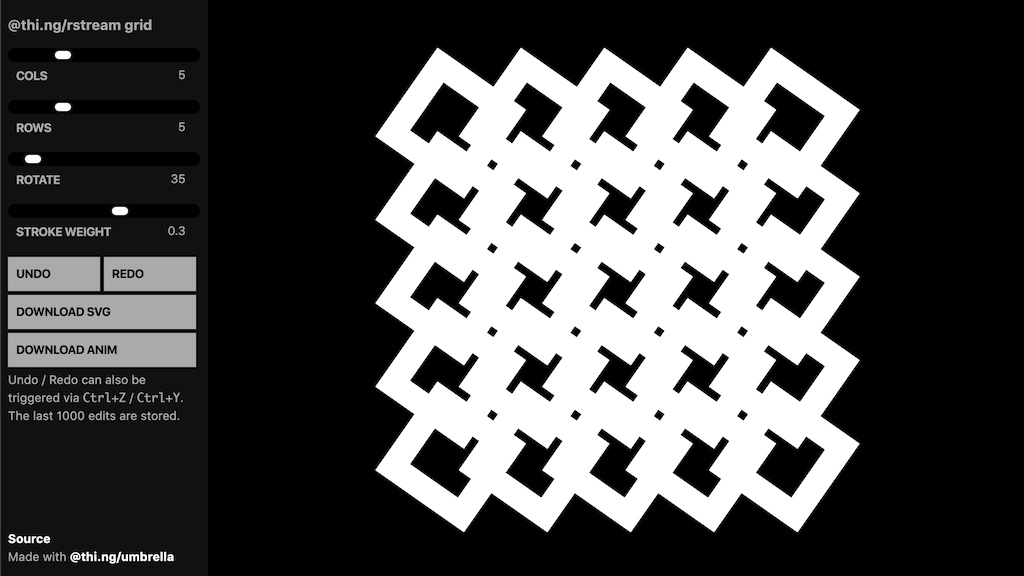 |
Interactive grid generator, SVG generation & export, undo/redo support | Demo | Source |
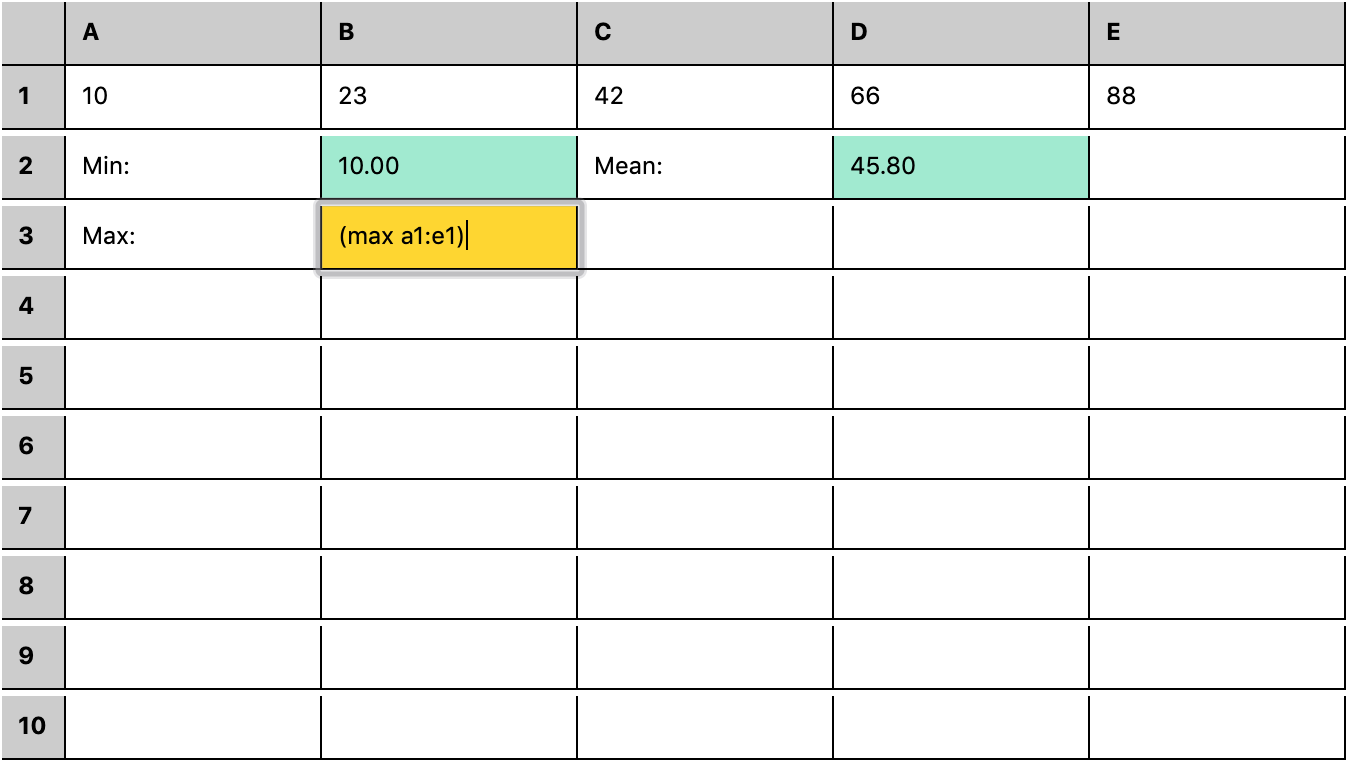 |
rstream based spreadsheet w/ S-expression formula DSL | Demo | Source |
 |
Fork-join worker-based raymarch renderer | Demo | Source |
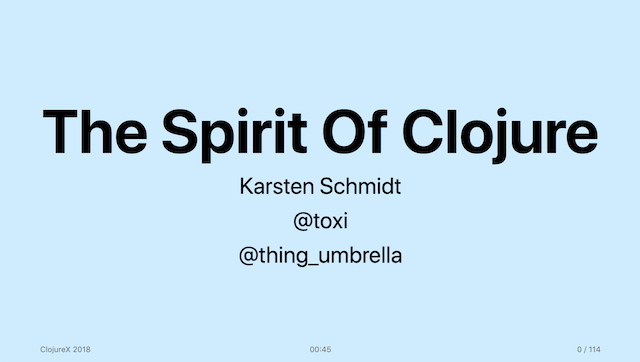 |
hdom based slide deck viewer & slides from my ClojureX 2018 keynote | Demo | Source |
| Transducer & rstream based hdom UI updates | Demo | Source |
Since version 3.0.0 all stream and subscription factory functions take an optional object of configuration options with at least these keys (each optional):
interface CommonOpts {
/**
* Internal ID associated with this stream. If omitted, an
* autogenerated ID will be used.
*/
id: string;
/**
* If false or `CloseMode.NEVER`, the stream stays active even if
* all inputs are done. If true (default) or `CloseMode.LAST`, the
* stream closes when the last input is done. If `CloseMode.FIRST`,
* the instance closes when the first input is done.
*
* @defaultValue CloseMode.LAST
*/
closeIn: CloseMode;
/**
* If false or `CloseMode.NEVER`, the stream stays active once there
* are no more subscribers. If true (default) or `CloseMode.LAST`,
* the stream closes when the last subscriber has unsubscribed. If
* `CloseMode.FIRST`, the instance closes when the first subscriber
* disconnects.
*
* @defaultValue CloseMode.LAST
*/
closeOut: CloseMode;
/**
* If true (default), stream caches last received value and pushes
* it to new subscriberswhen they subscribe. If false, calling
* `.deref()` on this stream will always return `undefined`.
*
* @defaultValue true
*/
cache: boolean;
}Source: stream()
Creates a new Stream instance, optionally with given StreamSource
function and / or ID. If a src function is provided, the function
will be only called (with the Stream instance as single argument)
once the first subscriber has attached to the stream. If the function
returns another function, it will be used for cleanup purposes if the
stream is cancelled, e.g. if the last subscriber has unsubscribed.
Streams are intended as (primarily async) data sources in a dataflow
graph and are the primary construct for the various from*()
functions provided by the package. However, streams can also be
triggered manually (from outside the stream), in which case the user
should call stream.next() to cause value propagation.
a = stream<number>((s) => {
s.next(1);
s.next(2);
s.done();
});
a.subscribe(trace("a"));
// a 1
// a 2
// a done
// as reactive value mechanism
b = stream<number>();
// or alternatively
// b = subscription();
b.subscribe(trace("b1"));
b.subscribe(trace("b2"));
// external trigger
b.next(42);
// b1 42
// b2 42Streams (like Subscriptions) implement the @thi.ng/api
IDeref
interface which provides read access to a stream's last received value.
This is useful for various purposes, e.g. in combination with
@thi.ng/hdom, which supports direct embedding of streams (i.e. their
values) into UI components (and will be deref'd automatically). If the
stream has not yet emitted a value or if the stream is done, it will
deref to undefined.
Source: subscription()
Creates a new Subscription instance, the fundamental datatype &
building block provided by this package (Streams are Subscriptions
too). Subscriptions can be:
- linked into directed graphs (if async, not necessarily DAGs)
- transformed using transducers (incl. early termination)
- can have any number of subscribers (optionally each w/ their own transducer)
- recursively unsubscribe themselves from parent after their last subscriber unsubscribed
- will go into a non-recoverable error state if NONE of the subscribers has an error handler itself
- implement the @thi.ng/api
IDerefinterface
// as reactive value mechanism (same as with stream() above)
s = subscription<any, any>();
s.subscribe(trace("s1"));
s.subscribe(trace("s2"), tx.filter((x) => x > 25));
// external trigger
s.next(23);
// s1 23
s.next(42);
// s2 42
// s1 42- fromAtom() - streams from value changes in atoms/cursors
- fromChannel() - CSP channel to stream conversion
- fromEvent() - events
- fromDOMEvent() - DOM events
- fromInterval() - interval based counters
- fromIterable() - arrays, iterators / generators (async & sync)
- fromPromise() - single value stream from promise
- fromPromises() - results from multiple promise
- fromRAF() - requestAnimationFrame() counter (w/ node fallback)
- fromView() - derived view changes (see @thi.ng/atom)
- fromWorker() - messages received from worker
- trigger() - one-off events
Source: metaStream()
MetaStreams are streams of streams. A MetaStream is a subscription
type which transforms each incoming value into a new stream, subscribes
to it (via an hidden / internal subscription) and then only passes
values from that stream to its own subscribers. If a new value is
received, the meta stream first unsubscribes from the possibly still
active stream created from the previous input, before creating and
subscribing to the new stream. Hence this stream type is useful for
cases where streams need to be dynamically and invisibly created &
inserted into an existing dataflow topology without changing it, and
with the guarantee that never more than one of these is active at the
same time. Similar behavior (without the restriction in number) can be
achieved using merge() (see further below).
The user supplied factory function will be called for each incoming
value and is responsible for creating the new stream instances. If the
function returns null / undefined, no further action will be taken
(acts like a filter transducer, i.e. the incoming value is simply
ignored).
// transform each received odd number into a stream
// producing 3 copies of that number in the metastream
// even numbers are ignored
a = metastream<number, string>(
(x) => (x & 1)
? fromIterable(tx.repeat("odd: " + x, 3), { delay: 100 })
: null
);
a.subscribe(trace())
a.next(23)
// odd: 23
// odd: 23
// odd: 23
a.next(42) // not odd, ignored by meta factory fn
a.next(43)
// odd: 43
// odd: 43
// odd: 43The factory function does NOT need to create new streams, but too can merely return other existing streams, and so making the meta stream act like a switch / stream selector.
If the meta stream is the only subscriber to these input streams, you'll
need to use the closeOut: CloseMode.NEVER option when creating the
inputs. This keeps them alive and allows for dynamic switching between
them.
// infinite inputs
a = fromIterable(
tx.repeat("a"),
{ delay: 1000, closeOut: CloseMode.NEVER }
);
b = fromIterable(
tx.repeat("b"),
{ delay: 1000, closeOut: CloseMode.NEVER }
);
// stream selector / switch
m = metaStream((x) => x ? a : b);
m.subscribe(trace("meta from: "));
m.next(true);
// meta from: a
m.next(false);
// meta from: b
m.next(true);
// meta from: aSource: merge()
Returns a new StreamMerge instance, a subscription type consuming
inputs from multiple inputs and passing received values on to any
subscribers. Input streams can be added and removed dynamically. By
default, StreamMerge calls done() when the last active input is
done, but this behavior can be overridden via the close option, using
CloseMode enums.
merge({
// input streams w/ different frequencies
src: [
fromIterable([1, 2, 3], { delay: 10 }),
fromIterable([10, 20, 30], { delay: 21 }),
fromIterable([100, 200, 300], { delay: 7 })
]
}).subscribe(trace());
// 100
// 1
// 200
// 10
// 2
// 300
// 3
// 20
// 30Use the labeled()
transducer
for each input to create a stream of labeled values and track their
provenance:
merge({
src: [
fromIterable([1, 2, 3]).transform(tx.labeled("a")),
fromIterable([10, 20, 30]).transform(tx.labeled("b")),
]
}).subscribe(trace());
// ["a", 1]
// ["b", 10]
// ["a", 2]
// ["b", 20]
// ["a", 3]
// ["b", 30]See StreamMergeOpts for further reference of the various behavior options.
If the StreamMerge receives a Subscription-like value from any of
its inputs, it will not be processed as usual, but instead will be added
as new input to the merge and then automatically remove once that stream
is exhausted.
// stream source w/ transducer mapping values to new streams
a = stream().transform(tx.map((x) => fromIterable(tx.repeat(x, 3))));
// simple 1Hz counter
b = fromInterval(1000);
merge({ src: [a, b] }).subscribe(trace());
// 0
// 1
// 2
// sent "a" will be transformed into stream via above transducer
// and then auto-added as new input to the StreamMerge
a.next("a");
// a
// a
// a
// 3
// 4Source: sync()
Similar to StreamMerge above, but with extra synchronization of
inputs. Before emitting any new values, StreamSync collects values
until at least one has been received from all inputs. Once that's the
case, the collected values are sent as labeled tuple object to
downstream subscribers. Each value in the emitted tuple objects is
stored under their input stream's ID. Only the last value received from
each input is passed on. After the initial tuple has been emitted, you
can choose from two possible behaviors:
- Any future change in any input will produce a new result tuple. These tuples will retain the most recently read values from other inputs. This behavior is the default and illustrated in the above schematic.
- If the
resetoption istrue, every input will have to provide at least one new value again until another result tuple is produced.
Any done inputs are automatically removed. By default, StreamSync
calls done() when the last active input is done, but this behavior can
be overridden via the close constructor option, using CloseMode enums.
const a = stream();
const b = stream();
s = sync<any,any>({ src: { a, b } }).subscribe(trace("result: "));
a.next(1);
b.next(2);
// result: { a: 1, b: 2 }Input streams can be added and removed dynamically and the emitted tuple size adjusts to the current number of inputs (the next time a value is received from any input).
If the reset option is enabled, the last emitted tuple is allowed to
be incomplete, by default. To only allow complete tuples, also set the
all option to false.
The synchronization is done via the
partitionSync()
transducer from the @thi.ng/transducers package. See this function's
docs for further details.
See StreamSyncOpts for further reference of the various behavior options.
Source: pubsub()
Topic based stream splitter. Applies topic function to each
received value and only forwards it to child subscriptions for
returned topic. The actual topic (return value from topic fn) can
be of any type, apart from undefined. Complex topics (e.g objects /
arrays) are allowed and they're matched with registered topics using
@thi.ng/equiv by default (but customizable via equiv option).
Each topic can have any number of subscribers.
If a transducer is specified for the PubSub, it is always applied
prior to passing the input to the topic function. I.e. in this case
the topic function will receive the transformed inputs.
PubSub supports dynamic topic subscriptions and unsubscriptions via
subscribeTopic() and unsubscribeTopic(). However, the standard
subscribe() / unsubscribe() methods are NOT supported (since
meaningless here) and will throw an error! unsubscribe() can only be
called WITHOUT argument to unsubscribe the entire PubSub instance
(incl. all topic subscriptions) from the parent stream.
Source: bisect()
Returns a new PubSub instance using given predicate pred as boolean
topic function and a & b as subscribers for truthy (a) and falsy
b values.
fromIterable([1, 2, 3, 4]).subscribe(
bisect((x) => !!(x & 1), trace("odd"), trace("even"))
);
// odd 1
// even 2
// odd 3
// even 4
// odd done
// even doneIf a or b need to be subscribed to directly, then a / b MUST be
first created as Subscription (if not already) and a reference kept
prior to calling bisect().
const odd = subscription();
const even = subscription();
odd.subscribe(trace("odd"));
odd.subscribe(trace("odd x10"), tx.map((x) => x * 10));
even.subscribe(trace("even"));
fromIterable([1, 2, 3, 4]).subscribe(bisect((x) => !!(x & 1), odd, even));
// odd x10 10
// odd 1
// even 2
// odd x10 30
// odd 3
// even 4
// odd done
// odd x10 done
// even doneSource: sidechainPartition()
Buffers values from src until side chain fires, then emits buffer
(unless empty) and repeats process until either input is done. By
default, the value read from the side chain is ignored, however the
optional predicate can be used to only trigger for specific values /
conditions.
// merge various event streams
merge([
fromEvent(document, "mousemove"),
fromEvent(document, "mousedown"),
fromEvent(document, "mouseup")
])
// queue event processing to only execute during the
// requestAnimationFrame cycle (RAF)
.subscribe(sidechainPartition(fromRAF()))
.subscribe(trace());Source: sidechainToggle()
Filters values from input based on values received from side chain. By default, the value read from the side chain is ignored, however the optional predicate can be used to only trigger for specific values/conditions. Every time the predicate fn returns true, the filter will be toggled on/off. Whilst switched off, no input values will be forwarded.
// use slower interval stream to toggle main stream on/off
fromInterval(500)
.subscribe(sidechainToggle(fromInterval(1000)))
.subscribe(trace());
// 0
// 3
// 4
// 7
// 8
...Source: forkJoin()
const $self: Worker = <any>self;
self.addEventListener("message", (e) => {
const { buf, factor } = e.data;
$self.postMessage(buf.map((x) => x * factor));
});const src = stream<number[]>();
// fork worker jobs & re-join results
forkJoin({
src: src,
// worker job preparation
// this function is called for each worker ID and the results
// of that function are the messages sent to the workers...
fork: (id, numWorkers, buf) => {
const size = (buf.length / numWorkers) | 0;
return {
buf: id < numWorkers - 1
? buf.slice(id * size, (id + 1) * size)
: buf.slice(id * size),
factor: id * 10
};
},
// re-join worker results
join: (parts) => <number[]>Array.prototype.concat.apply([], parts),
// worker script
worker: "./worker.js",
// default: navigator.hardwareConcurrency
numWorkers: 4
}).subscribe(trace("results"));
src.next(new Array(16).fill(1));
// result: [0, 0, 0, 0, 10, 10, 10, 10, 20, 20, 20, 20, 30, 30, 30, 30]Source: tunnel()
Delegate stream value processing to workers and pass on their responses to downstream subscriptions. Supports multiple worker instances and worker termination / restart for each new stream value received.
Source: postWorker()
Send values to workers (incl. optional (inline) worker instantiation)
Source: fromWorker()
Create value stream from worker messages.
- resolve - resolve on-stream promises
- trace - debug helper
- transduce - transduce or just reduce an entire stream into a promise
- tween - stream interpolation
- Karsten Schmidt (@postspectacular)
- André Wachter (@andrew8er)
- Gavin Cannizzaro (@gavinpc-mindgrub)
© 2017 - 2020 Karsten Schmidt // Apache Software License 2.0



